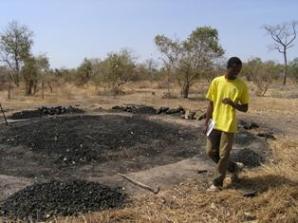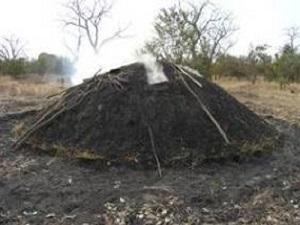Karl Wurster
This project uses a combination of remote sensing, forestry surveys and semi-structured interviews to assess the effects of land management practices on forest sustainability around charcoal production zones in south-eastern Senegal.

David at site.
In much of Sub-Saharan Africa, more than 75% of a rapidly growing urban population depends on charcoal as their primary source of energy for cooking. The high demand for charcoal has led many to believe that charcoal harvesting catalyses widespread deforestation. The Senegalese government and international donors have initiated projects within protected areas to combat deforestation and created land management plans to sustainably harvest charcoal. To date, the effects of forest management techniques on forest sustainability are still in question.

A typical charcoal kiln.
The goal of this research is to determine the effects of charcoal production and management practices on forest regeneration in Senegal. To accomplish this, a multi-phase approach integrating satellite imagery with field surveys will be used to:
1) assess the sensitivity of satellite technology to detect changes in forest cover in charcoal production zones;
2) determine the regional and local effects of charcoal production on forest regeneration rates and biomass;
3) assess the effect of varying management strategies on a sustainable charcoal harvest.
Phase I involves testing the Multiangle Imaging SpectroRadiometer (MISR) satellites capability in detecting structural changes in vegetative cover caused by charcoal harvesting and production. Preliminary analysis of the MISR derived k(red) parameter showed MISR can consistently differentiate between forest cover types and successfully differentiates between sites at pre- and post- charcoal harvest stages. Phase II conducts forestry and social surveys comparing and contrasting local effects of land management, land use, and charcoal production on forest regeneration. Phase III uses the local surveys to validate and train the regional remote sensing data to assess the effectiveness of land management in promoting forest regeneration and sustainability after charcoal harvesting.
Combining detailed local knowledge with the regional capabilities of remote sensing technology will provide valuable insight into the factors that control woodland regeneration and sustainability. The products created by this project will provide managers with additional information to create more effective land management strategies that can be implemented in Senegal and across sub-Saharan Africa, helping to ensure the long-term sustainability of woodland ecosystems and local livelihoods.